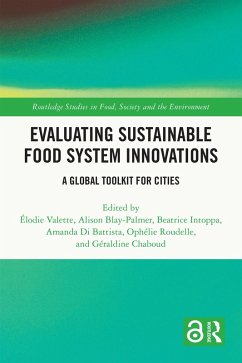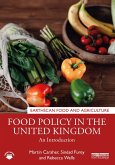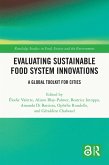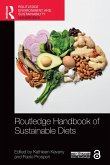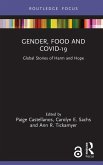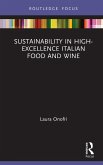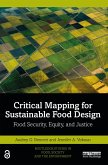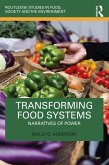Evaluating Sustainable Food System Innovations (eBook, ePUB)
A Global Toolkit for Cities
Redaktion: Valette, Élodie; Chaboud, Géraldine; Roudelle, Ophélie; Di Battista, Amanda; Intoppa, Beatrice; Blay-Palmer, Alison
0,00 €
0,00 €
inkl. MwSt.
Sofort per Download lieferbar

0 °P sammeln
0,00 €
Als Download kaufen

0,00 €
inkl. MwSt.
Sofort per Download lieferbar

0 °P sammeln
Jetzt verschenken
Alle Infos zum eBook verschenken
0,00 €
inkl. MwSt.
Sofort per Download lieferbar
Alle Infos zum eBook verschenken

0 °P sammeln
Evaluating Sustainable Food System Innovations (eBook, ePUB)
A Global Toolkit for Cities
Redaktion: Valette, Élodie; Chaboud, Géraldine; Roudelle, Ophélie; Di Battista, Amanda; Intoppa, Beatrice; Blay-Palmer, Alison
- Format: ePub
- Merkliste
- Auf die Merkliste
- Bewerten Bewerten
- Teilen
- Produkt teilen
- Produkterinnerung
- Produkterinnerung

Bitte loggen Sie sich zunächst in Ihr Kundenkonto ein oder registrieren Sie sich bei
bücher.de, um das eBook-Abo tolino select nutzen zu können.
Hier können Sie sich einloggen
Hier können Sie sich einloggen
Sie sind bereits eingeloggt. Klicken Sie auf 2. tolino select Abo, um fortzufahren.

Bitte loggen Sie sich zunächst in Ihr Kundenkonto ein oder registrieren Sie sich bei bücher.de, um das eBook-Abo tolino select nutzen zu können.
This book presents URBAL, an approach that applies impact pathway mapping to understand how food system innovations in cities, and their territories, change and impact food system sustainability.
- Geräte: eReader
- ohne Kopierschutz
- eBook Hilfe
- Größe: 14.77MB
Andere Kunden interessierten sich auch für
![Food Policy in the United Kingdom (eBook, ePUB) Food Policy in the United Kingdom (eBook, ePUB)]() Martin CaraherFood Policy in the United Kingdom (eBook, ePUB)39,95 €
Martin CaraherFood Policy in the United Kingdom (eBook, ePUB)39,95 €![Evaluating Sustainable Food System Innovations (eBook, PDF) Evaluating Sustainable Food System Innovations (eBook, PDF)]() Evaluating Sustainable Food System Innovations (eBook, PDF)0,00 €
Evaluating Sustainable Food System Innovations (eBook, PDF)0,00 €![Routledge Handbook of Sustainable Diets (eBook, ePUB) Routledge Handbook of Sustainable Diets (eBook, ePUB)]() Routledge Handbook of Sustainable Diets (eBook, ePUB)46,95 €
Routledge Handbook of Sustainable Diets (eBook, ePUB)46,95 €![Gender, Food and COVID-19 (eBook, ePUB) Gender, Food and COVID-19 (eBook, ePUB)]() Gender, Food and COVID-19 (eBook, ePUB)0,00 €
Gender, Food and COVID-19 (eBook, ePUB)0,00 €![Sustainability in High-Excellence Italian Food and Wine (eBook, ePUB) Sustainability in High-Excellence Italian Food and Wine (eBook, ePUB)]() Laura OnofriSustainability in High-Excellence Italian Food and Wine (eBook, ePUB)21,95 €
Laura OnofriSustainability in High-Excellence Italian Food and Wine (eBook, ePUB)21,95 €![Critical Mapping for Sustainable Food Design (eBook, ePUB) Critical Mapping for Sustainable Food Design (eBook, ePUB)]() Audrey G. BennettCritical Mapping for Sustainable Food Design (eBook, ePUB)34,95 €
Audrey G. BennettCritical Mapping for Sustainable Food Design (eBook, ePUB)34,95 €![Transforming Food Systems (eBook, ePUB) Transforming Food Systems (eBook, ePUB)]() Molly D. AndersonTransforming Food Systems (eBook, ePUB)41,95 €
Molly D. AndersonTransforming Food Systems (eBook, ePUB)41,95 €-
-
-
This book presents URBAL, an approach that applies impact pathway mapping to understand how food system innovations in cities, and their territories, change and impact food system sustainability.
Dieser Download kann aus rechtlichen Gründen nur mit Rechnungsadresse in A, B, BG, CY, CZ, D, DK, EW, E, FIN, F, GR, HR, H, IRL, I, LT, L, LR, M, NL, PL, P, R, S, SLO, SK ausgeliefert werden.
Produktdetails
- Produktdetails
- Verlag: Taylor & Francis eBooks
- Seitenzahl: 232
- Erscheinungstermin: 28. August 2023
- Englisch
- ISBN-13: 9781000966206
- Artikelnr.: 68596779
- Verlag: Taylor & Francis eBooks
- Seitenzahl: 232
- Erscheinungstermin: 28. August 2023
- Englisch
- ISBN-13: 9781000966206
- Artikelnr.: 68596779
- Herstellerkennzeichnung Die Herstellerinformationen sind derzeit nicht verfügbar.
Élodie Valette is a geographer and a senior researcher at CIRAD (French Agricultural Research for Development) in Montpellier, France. She is the coordinator of the Urbal project. Alison Blay-Palmer is the UNESCO Chair in Sustainable Food Systems, the founding director of the Laurier Centre for Sustainable Food Systems, and a professor at Wilfrid Laurier University, Canada. She is the co-editor of Sustainable Food System Assessment (Routledge, 2019) and the scientific coordinator of the Urbal Project. Beatrice Intoppa is a project manager at the UNESCO Chair in World Food Systems at L'Institut Agro Montpellier, France. She holds an MA in Local Development from the University of Padua, Italy. Amanda Di Battista is the project coordinator of the Laurier Centre for Sustainable Food Systems, Canada. She produces the Handpicked: Stories from the Field podcast and is the co-editor of Food Studies: Matter, Meaning, Movement (2022) and Sustainable Food System Assessment (Routledge, 2019). Ophélie Roudelle is a project manager at the UNESCO Chair in World Food Systems in L'Institut Agro Montpellier, France. She is in charge of the valorization, dissemination, and popularization of research results of the Urbal project. Géraldine Chaboud holds a PhD in economics from Université de Montpellier, France, and has been a former project manager at the UNESCO Chair in World Food Systems in L'Institut Agro Montpellier, France.
1. Mapping change: The Urbal approach
Elodie Valette, Alison Blay-Palmer, Olivier Lepiller, and Amanda Di
Battista
2. Urbal: A research project
Alison Blay-Palmer, Elodie Valette, Olivier Lepiller, and Amanda Di
Battista
3. The role of chefs and gastronomy in transforming the Brasília food
system
Jessica Pereira Garcia, Mauro G. M. Capelari, Stéphane Guéneau, Tainá
Bacellar Zaneti, and Janaína D.A.S. Diniz
4. Traditional tortillas in Mexico: Opportunities and challenges for
producers and consumers
Héloïse Leloup and Julie Le Gall
5. The role of school canteens in building more sustainable food systems:
The impact pathways of the "Ma Cantine Autrement" programme in Montpellier
Marlène Perignon, Olivier Lepiller, Beatrice Intoppa, Elodie Valette,
Ophélie Roudelle, and Amélie Wood
6. The potential of short food supply chains for sustainable urban
agri-food systems: The UFIL of Milano Ristorazione
Giulia Bartezzaghi and Federico Caniato
7. Studying the impact of e-commerce on the sustainability of food systems
in Vietnam
Michaël Bruckert, Olivier Lepiller, Denis Sautier, Nguyen Thi Tan Loc, and
Nguyen Thi Sau
8. Ecofriendly farmsystems: Testing the Urbal approach in Berlin
Lucas Hövelmann and Undine Giseke
9. Agricultural Districts as tools for sustainable urban food systems: the
case of Milan
Valerio Bini and Giacomo Zanolin
10. The Urbal approach and the after-life of a food systems innovation
process: The Nourish to Flourish governance process in Cape Town, South
Africa
Gareth Haysom and Jane Battersby
11. Using Urbal to develop metrics for evaluation
Beatrice Intoppa and Elodie Valette
Elodie Valette, Alison Blay-Palmer, Olivier Lepiller, and Amanda Di
Battista
2. Urbal: A research project
Alison Blay-Palmer, Elodie Valette, Olivier Lepiller, and Amanda Di
Battista
3. The role of chefs and gastronomy in transforming the Brasília food
system
Jessica Pereira Garcia, Mauro G. M. Capelari, Stéphane Guéneau, Tainá
Bacellar Zaneti, and Janaína D.A.S. Diniz
4. Traditional tortillas in Mexico: Opportunities and challenges for
producers and consumers
Héloïse Leloup and Julie Le Gall
5. The role of school canteens in building more sustainable food systems:
The impact pathways of the "Ma Cantine Autrement" programme in Montpellier
Marlène Perignon, Olivier Lepiller, Beatrice Intoppa, Elodie Valette,
Ophélie Roudelle, and Amélie Wood
6. The potential of short food supply chains for sustainable urban
agri-food systems: The UFIL of Milano Ristorazione
Giulia Bartezzaghi and Federico Caniato
7. Studying the impact of e-commerce on the sustainability of food systems
in Vietnam
Michaël Bruckert, Olivier Lepiller, Denis Sautier, Nguyen Thi Tan Loc, and
Nguyen Thi Sau
8. Ecofriendly farmsystems: Testing the Urbal approach in Berlin
Lucas Hövelmann and Undine Giseke
9. Agricultural Districts as tools for sustainable urban food systems: the
case of Milan
Valerio Bini and Giacomo Zanolin
10. The Urbal approach and the after-life of a food systems innovation
process: The Nourish to Flourish governance process in Cape Town, South
Africa
Gareth Haysom and Jane Battersby
11. Using Urbal to develop metrics for evaluation
Beatrice Intoppa and Elodie Valette
1. Mapping change: The Urbal approach
Elodie Valette, Alison Blay-Palmer, Olivier Lepiller, and Amanda Di
Battista
2. Urbal: A research project
Alison Blay-Palmer, Elodie Valette, Olivier Lepiller, and Amanda Di
Battista
3. The role of chefs and gastronomy in transforming the Brasília food
system
Jessica Pereira Garcia, Mauro G. M. Capelari, Stéphane Guéneau, Tainá
Bacellar Zaneti, and Janaína D.A.S. Diniz
4. Traditional tortillas in Mexico: Opportunities and challenges for
producers and consumers
Héloïse Leloup and Julie Le Gall
5. The role of school canteens in building more sustainable food systems:
The impact pathways of the "Ma Cantine Autrement" programme in Montpellier
Marlène Perignon, Olivier Lepiller, Beatrice Intoppa, Elodie Valette,
Ophélie Roudelle, and Amélie Wood
6. The potential of short food supply chains for sustainable urban
agri-food systems: The UFIL of Milano Ristorazione
Giulia Bartezzaghi and Federico Caniato
7. Studying the impact of e-commerce on the sustainability of food systems
in Vietnam
Michaël Bruckert, Olivier Lepiller, Denis Sautier, Nguyen Thi Tan Loc, and
Nguyen Thi Sau
8. Ecofriendly farmsystems: Testing the Urbal approach in Berlin
Lucas Hövelmann and Undine Giseke
9. Agricultural Districts as tools for sustainable urban food systems: the
case of Milan
Valerio Bini and Giacomo Zanolin
10. The Urbal approach and the after-life of a food systems innovation
process: The Nourish to Flourish governance process in Cape Town, South
Africa
Gareth Haysom and Jane Battersby
11. Using Urbal to develop metrics for evaluation
Beatrice Intoppa and Elodie Valette
Elodie Valette, Alison Blay-Palmer, Olivier Lepiller, and Amanda Di
Battista
2. Urbal: A research project
Alison Blay-Palmer, Elodie Valette, Olivier Lepiller, and Amanda Di
Battista
3. The role of chefs and gastronomy in transforming the Brasília food
system
Jessica Pereira Garcia, Mauro G. M. Capelari, Stéphane Guéneau, Tainá
Bacellar Zaneti, and Janaína D.A.S. Diniz
4. Traditional tortillas in Mexico: Opportunities and challenges for
producers and consumers
Héloïse Leloup and Julie Le Gall
5. The role of school canteens in building more sustainable food systems:
The impact pathways of the "Ma Cantine Autrement" programme in Montpellier
Marlène Perignon, Olivier Lepiller, Beatrice Intoppa, Elodie Valette,
Ophélie Roudelle, and Amélie Wood
6. The potential of short food supply chains for sustainable urban
agri-food systems: The UFIL of Milano Ristorazione
Giulia Bartezzaghi and Federico Caniato
7. Studying the impact of e-commerce on the sustainability of food systems
in Vietnam
Michaël Bruckert, Olivier Lepiller, Denis Sautier, Nguyen Thi Tan Loc, and
Nguyen Thi Sau
8. Ecofriendly farmsystems: Testing the Urbal approach in Berlin
Lucas Hövelmann and Undine Giseke
9. Agricultural Districts as tools for sustainable urban food systems: the
case of Milan
Valerio Bini and Giacomo Zanolin
10. The Urbal approach and the after-life of a food systems innovation
process: The Nourish to Flourish governance process in Cape Town, South
Africa
Gareth Haysom and Jane Battersby
11. Using Urbal to develop metrics for evaluation
Beatrice Intoppa and Elodie Valette
